Reflective Learning Strategy for Business and Management Studies Essay
VerifiedAdded on 2022/01/13
|6
|2031
|266
Essay
AI Summary
This essay provides a comprehensive overview of reflective learning, specifically within the context of business and management. It emphasizes the significance of reflective learning as a student-centered teaching method that encourages self-evaluation of learning experiences. The essay discusses the application of feedback, both formative and summative, to enhance future work, and highlights the importance of understanding cultural and behavioral expectations within the field. It also explores the benefits of peer-to-peer support and collaborative learning environments. The essay references Kolb's experiential learning model, illustrating how students can gain knowledge through experience, reflection, and active experimentation. Furthermore, it addresses the impact of real-world events, such as the COVID-19 pandemic, on business operations and the importance of adapting to changing circumstances. The essay concludes by reiterating the value of the reflective approach to learning as a highly effective tool for personal and professional development.
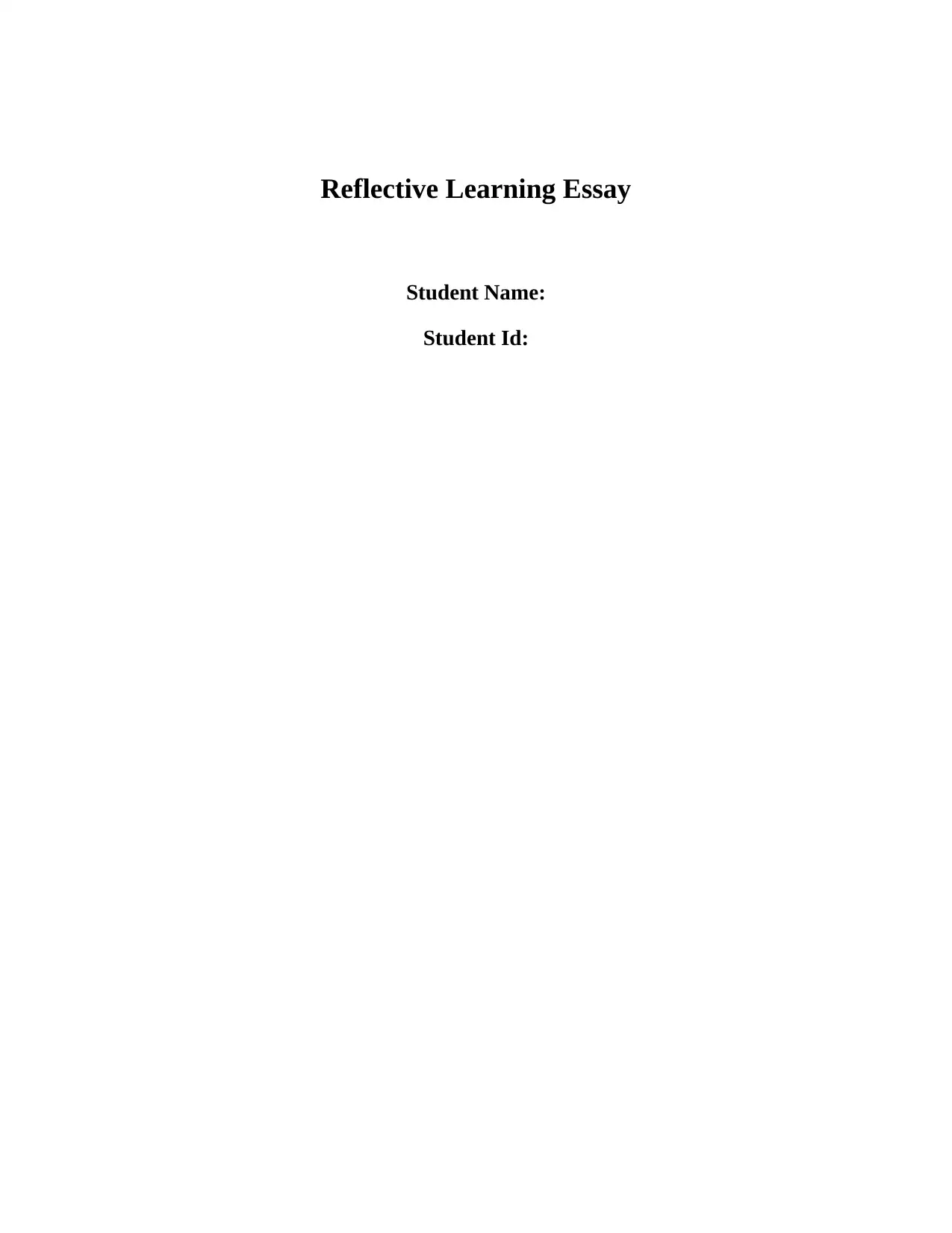
Reflective Learning Essay
Student Name:
Student Id:
Student Name:
Student Id:
Paraphrase This Document
Need a fresh take? Get an instant paraphrase of this document with our AI Paraphraser
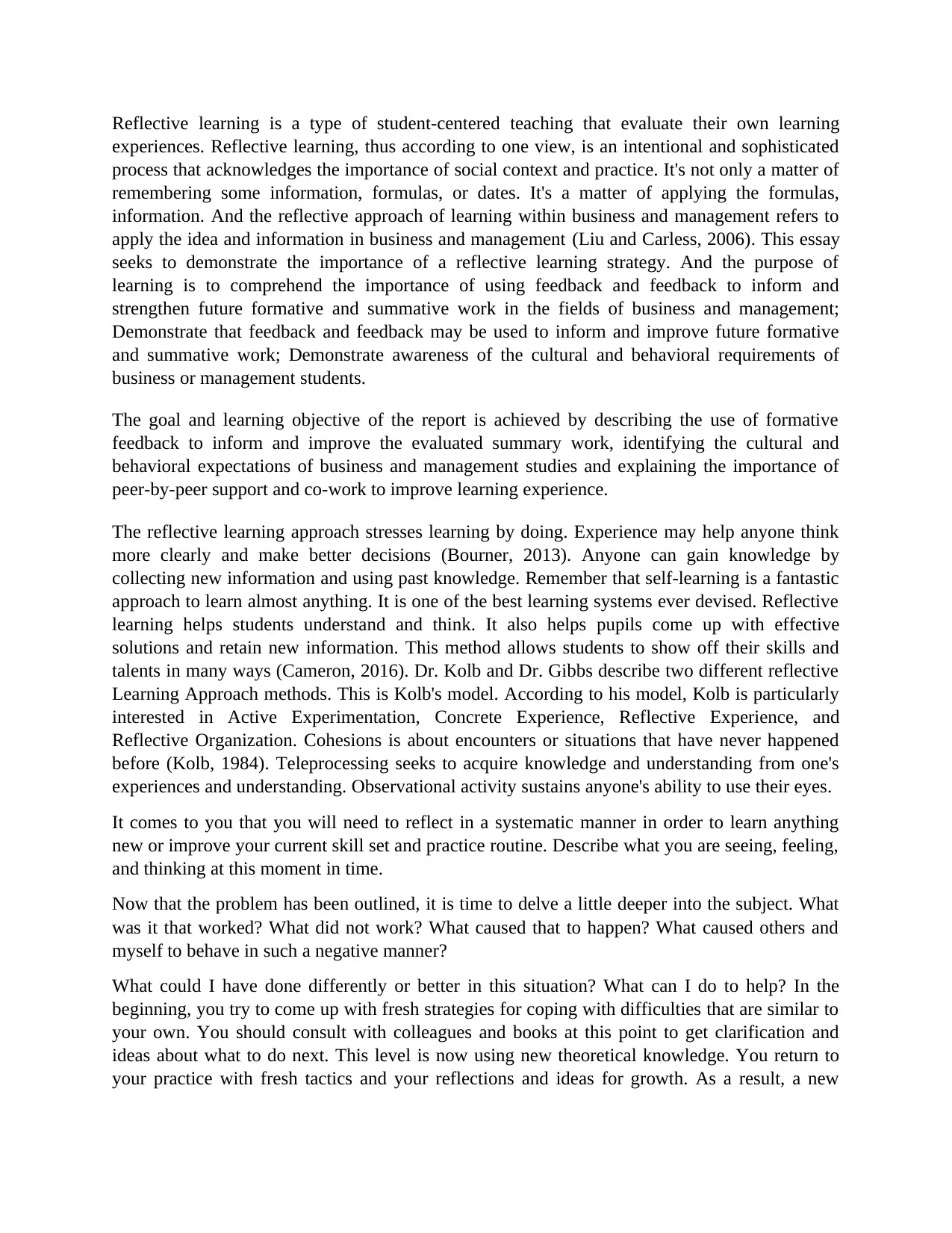
Reflective learning is a type of student-centered teaching that evaluate their own learning
experiences. Reflective learning, thus according to one view, is an intentional and sophisticated
process that acknowledges the importance of social context and practice. It's not only a matter of
remembering some information, formulas, or dates. It's a matter of applying the formulas,
information. And the reflective approach of learning within business and management refers to
apply the idea and information in business and management (Liu and Carless, 2006). This essay
seeks to demonstrate the importance of a reflective learning strategy. And the purpose of
learning is to comprehend the importance of using feedback and feedback to inform and
strengthen future formative and summative work in the fields of business and management;
Demonstrate that feedback and feedback may be used to inform and improve future formative
and summative work; Demonstrate awareness of the cultural and behavioral requirements of
business or management students.
The goal and learning objective of the report is achieved by describing the use of formative
feedback to inform and improve the evaluated summary work, identifying the cultural and
behavioral expectations of business and management studies and explaining the importance of
peer-by-peer support and co-work to improve learning experience.
The reflective learning approach stresses learning by doing. Experience may help anyone think
more clearly and make better decisions (Bourner, 2013). Anyone can gain knowledge by
collecting new information and using past knowledge. Remember that self-learning is a fantastic
approach to learn almost anything. It is one of the best learning systems ever devised. Reflective
learning helps students understand and think. It also helps pupils come up with effective
solutions and retain new information. This method allows students to show off their skills and
talents in many ways (Cameron, 2016). Dr. Kolb and Dr. Gibbs describe two different reflective
Learning Approach methods. This is Kolb's model. According to his model, Kolb is particularly
interested in Active Experimentation, Concrete Experience, Reflective Experience, and
Reflective Organization. Cohesions is about encounters or situations that have never happened
before (Kolb, 1984). Teleprocessing seeks to acquire knowledge and understanding from one's
experiences and understanding. Observational activity sustains anyone's ability to use their eyes.
It comes to you that you will need to reflect in a systematic manner in order to learn anything
new or improve your current skill set and practice routine. Describe what you are seeing, feeling,
and thinking at this moment in time.
Now that the problem has been outlined, it is time to delve a little deeper into the subject. What
was it that worked? What did not work? What caused that to happen? What caused others and
myself to behave in such a negative manner?
What could I have done differently or better in this situation? What can I do to help? In the
beginning, you try to come up with fresh strategies for coping with difficulties that are similar to
your own. You should consult with colleagues and books at this point to get clarification and
ideas about what to do next. This level is now using new theoretical knowledge. You return to
your practice with fresh tactics and your reflections and ideas for growth. As a result, a new
experiences. Reflective learning, thus according to one view, is an intentional and sophisticated
process that acknowledges the importance of social context and practice. It's not only a matter of
remembering some information, formulas, or dates. It's a matter of applying the formulas,
information. And the reflective approach of learning within business and management refers to
apply the idea and information in business and management (Liu and Carless, 2006). This essay
seeks to demonstrate the importance of a reflective learning strategy. And the purpose of
learning is to comprehend the importance of using feedback and feedback to inform and
strengthen future formative and summative work in the fields of business and management;
Demonstrate that feedback and feedback may be used to inform and improve future formative
and summative work; Demonstrate awareness of the cultural and behavioral requirements of
business or management students.
The goal and learning objective of the report is achieved by describing the use of formative
feedback to inform and improve the evaluated summary work, identifying the cultural and
behavioral expectations of business and management studies and explaining the importance of
peer-by-peer support and co-work to improve learning experience.
The reflective learning approach stresses learning by doing. Experience may help anyone think
more clearly and make better decisions (Bourner, 2013). Anyone can gain knowledge by
collecting new information and using past knowledge. Remember that self-learning is a fantastic
approach to learn almost anything. It is one of the best learning systems ever devised. Reflective
learning helps students understand and think. It also helps pupils come up with effective
solutions and retain new information. This method allows students to show off their skills and
talents in many ways (Cameron, 2016). Dr. Kolb and Dr. Gibbs describe two different reflective
Learning Approach methods. This is Kolb's model. According to his model, Kolb is particularly
interested in Active Experimentation, Concrete Experience, Reflective Experience, and
Reflective Organization. Cohesions is about encounters or situations that have never happened
before (Kolb, 1984). Teleprocessing seeks to acquire knowledge and understanding from one's
experiences and understanding. Observational activity sustains anyone's ability to use their eyes.
It comes to you that you will need to reflect in a systematic manner in order to learn anything
new or improve your current skill set and practice routine. Describe what you are seeing, feeling,
and thinking at this moment in time.
Now that the problem has been outlined, it is time to delve a little deeper into the subject. What
was it that worked? What did not work? What caused that to happen? What caused others and
myself to behave in such a negative manner?
What could I have done differently or better in this situation? What can I do to help? In the
beginning, you try to come up with fresh strategies for coping with difficulties that are similar to
your own. You should consult with colleagues and books at this point to get clarification and
ideas about what to do next. This level is now using new theoretical knowledge. You return to
your practice with fresh tactics and your reflections and ideas for growth. As a result, a new
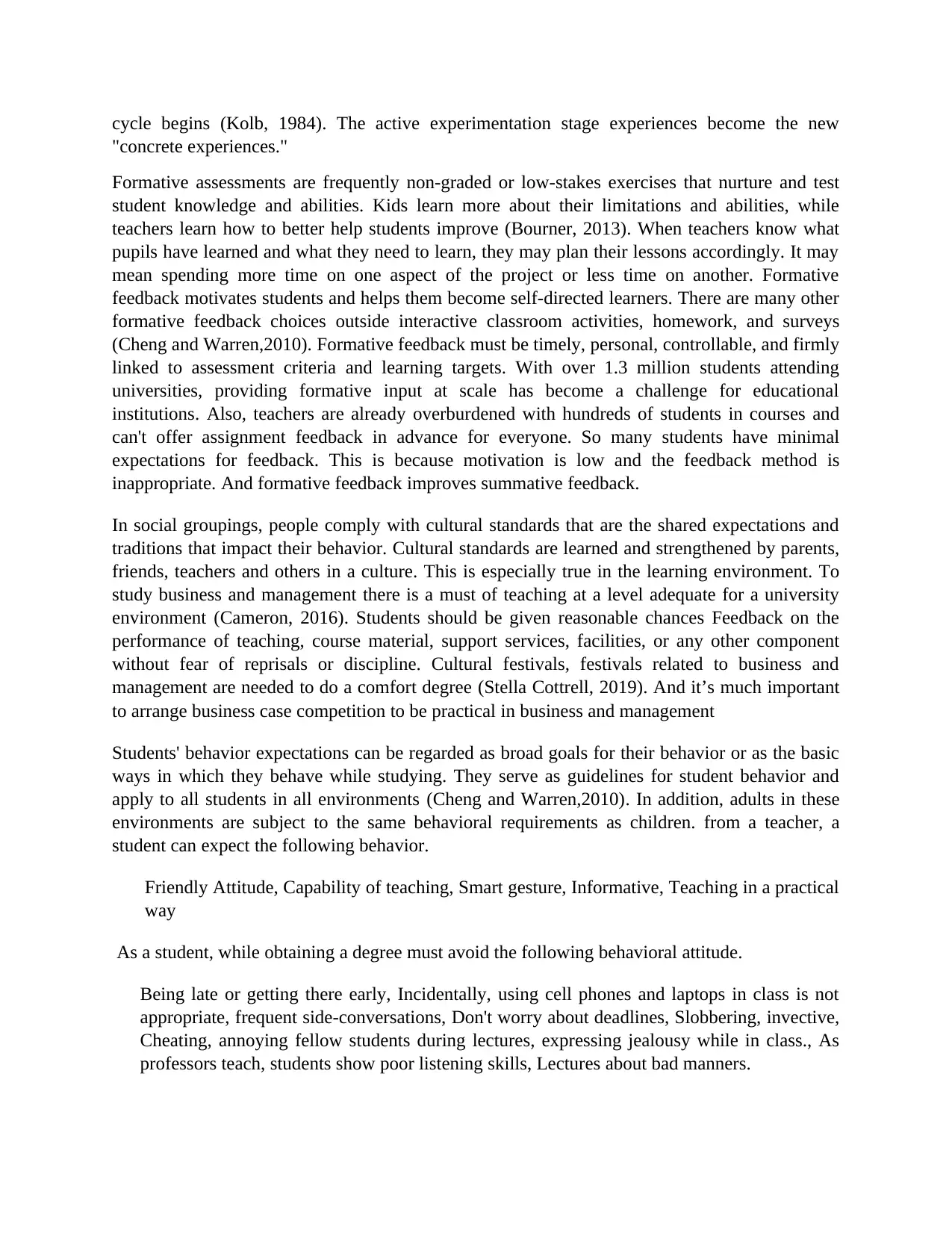
cycle begins (Kolb, 1984). The active experimentation stage experiences become the new
"concrete experiences."
Formative assessments are frequently non-graded or low-stakes exercises that nurture and test
student knowledge and abilities. Kids learn more about their limitations and abilities, while
teachers learn how to better help students improve (Bourner, 2013). When teachers know what
pupils have learned and what they need to learn, they may plan their lessons accordingly. It may
mean spending more time on one aspect of the project or less time on another. Formative
feedback motivates students and helps them become self-directed learners. There are many other
formative feedback choices outside interactive classroom activities, homework, and surveys
(Cheng and Warren,2010). Formative feedback must be timely, personal, controllable, and firmly
linked to assessment criteria and learning targets. With over 1.3 million students attending
universities, providing formative input at scale has become a challenge for educational
institutions. Also, teachers are already overburdened with hundreds of students in courses and
can't offer assignment feedback in advance for everyone. So many students have minimal
expectations for feedback. This is because motivation is low and the feedback method is
inappropriate. And formative feedback improves summative feedback.
In social groupings, people comply with cultural standards that are the shared expectations and
traditions that impact their behavior. Cultural standards are learned and strengthened by parents,
friends, teachers and others in a culture. This is especially true in the learning environment. To
study business and management there is a must of teaching at a level adequate for a university
environment (Cameron, 2016). Students should be given reasonable chances Feedback on the
performance of teaching, course material, support services, facilities, or any other component
without fear of reprisals or discipline. Cultural festivals, festivals related to business and
management are needed to do a comfort degree (Stella Cottrell, 2019). And it’s much important
to arrange business case competition to be practical in business and management
Students' behavior expectations can be regarded as broad goals for their behavior or as the basic
ways in which they behave while studying. They serve as guidelines for student behavior and
apply to all students in all environments (Cheng and Warren,2010). In addition, adults in these
environments are subject to the same behavioral requirements as children. from a teacher, a
student can expect the following behavior.
Friendly Attitude, Capability of teaching, Smart gesture, Informative, Teaching in a practical
way
As a student, while obtaining a degree must avoid the following behavioral attitude.
Being late or getting there early, Incidentally, using cell phones and laptops in class is not
appropriate, frequent side-conversations, Don't worry about deadlines, Slobbering, invective,
Cheating, annoying fellow students during lectures, expressing jealousy while in class., As
professors teach, students show poor listening skills, Lectures about bad manners.
"concrete experiences."
Formative assessments are frequently non-graded or low-stakes exercises that nurture and test
student knowledge and abilities. Kids learn more about their limitations and abilities, while
teachers learn how to better help students improve (Bourner, 2013). When teachers know what
pupils have learned and what they need to learn, they may plan their lessons accordingly. It may
mean spending more time on one aspect of the project or less time on another. Formative
feedback motivates students and helps them become self-directed learners. There are many other
formative feedback choices outside interactive classroom activities, homework, and surveys
(Cheng and Warren,2010). Formative feedback must be timely, personal, controllable, and firmly
linked to assessment criteria and learning targets. With over 1.3 million students attending
universities, providing formative input at scale has become a challenge for educational
institutions. Also, teachers are already overburdened with hundreds of students in courses and
can't offer assignment feedback in advance for everyone. So many students have minimal
expectations for feedback. This is because motivation is low and the feedback method is
inappropriate. And formative feedback improves summative feedback.
In social groupings, people comply with cultural standards that are the shared expectations and
traditions that impact their behavior. Cultural standards are learned and strengthened by parents,
friends, teachers and others in a culture. This is especially true in the learning environment. To
study business and management there is a must of teaching at a level adequate for a university
environment (Cameron, 2016). Students should be given reasonable chances Feedback on the
performance of teaching, course material, support services, facilities, or any other component
without fear of reprisals or discipline. Cultural festivals, festivals related to business and
management are needed to do a comfort degree (Stella Cottrell, 2019). And it’s much important
to arrange business case competition to be practical in business and management
Students' behavior expectations can be regarded as broad goals for their behavior or as the basic
ways in which they behave while studying. They serve as guidelines for student behavior and
apply to all students in all environments (Cheng and Warren,2010). In addition, adults in these
environments are subject to the same behavioral requirements as children. from a teacher, a
student can expect the following behavior.
Friendly Attitude, Capability of teaching, Smart gesture, Informative, Teaching in a practical
way
As a student, while obtaining a degree must avoid the following behavioral attitude.
Being late or getting there early, Incidentally, using cell phones and laptops in class is not
appropriate, frequent side-conversations, Don't worry about deadlines, Slobbering, invective,
Cheating, annoying fellow students during lectures, expressing jealousy while in class., As
professors teach, students show poor listening skills, Lectures about bad manners.
⊘ This is a preview!⊘
Do you want full access?
Subscribe today to unlock all pages.

Trusted by 1+ million students worldwide
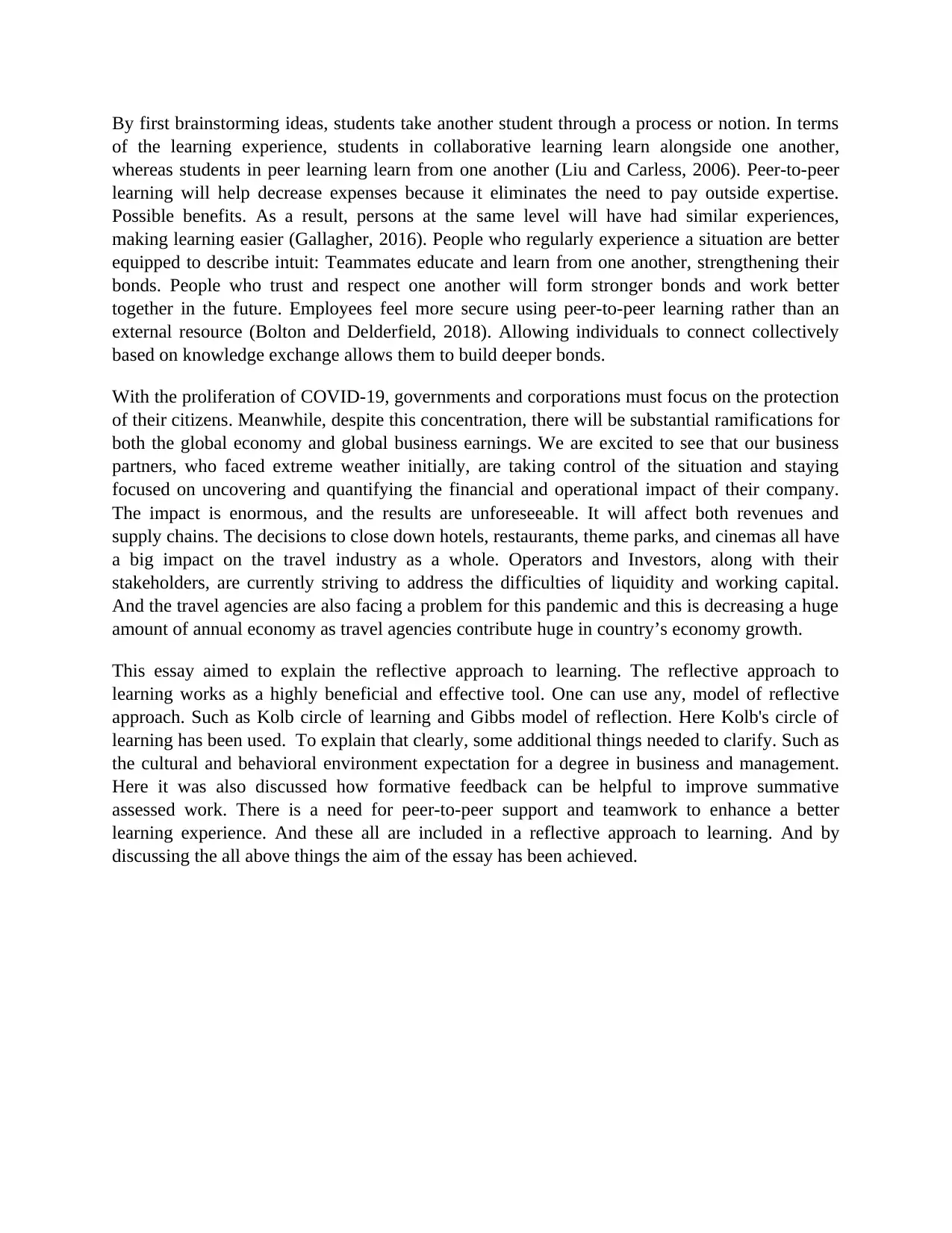
By first brainstorming ideas, students take another student through a process or notion. In terms
of the learning experience, students in collaborative learning learn alongside one another,
whereas students in peer learning learn from one another (Liu and Carless, 2006). Peer-to-peer
learning will help decrease expenses because it eliminates the need to pay outside expertise.
Possible benefits. As a result, persons at the same level will have had similar experiences,
making learning easier (Gallagher, 2016). People who regularly experience a situation are better
equipped to describe intuit: Teammates educate and learn from one another, strengthening their
bonds. People who trust and respect one another will form stronger bonds and work better
together in the future. Employees feel more secure using peer-to-peer learning rather than an
external resource (Bolton and Delderfield, 2018). Allowing individuals to connect collectively
based on knowledge exchange allows them to build deeper bonds.
With the proliferation of COVID-19, governments and corporations must focus on the protection
of their citizens. Meanwhile, despite this concentration, there will be substantial ramifications for
both the global economy and global business earnings. We are excited to see that our business
partners, who faced extreme weather initially, are taking control of the situation and staying
focused on uncovering and quantifying the financial and operational impact of their company.
The impact is enormous, and the results are unforeseeable. It will affect both revenues and
supply chains. The decisions to close down hotels, restaurants, theme parks, and cinemas all have
a big impact on the travel industry as a whole. Operators and Investors, along with their
stakeholders, are currently striving to address the difficulties of liquidity and working capital.
And the travel agencies are also facing a problem for this pandemic and this is decreasing a huge
amount of annual economy as travel agencies contribute huge in country’s economy growth.
This essay aimed to explain the reflective approach to learning. The reflective approach to
learning works as a highly beneficial and effective tool. One can use any, model of reflective
approach. Such as Kolb circle of learning and Gibbs model of reflection. Here Kolb's circle of
learning has been used. To explain that clearly, some additional things needed to clarify. Such as
the cultural and behavioral environment expectation for a degree in business and management.
Here it was also discussed how formative feedback can be helpful to improve summative
assessed work. There is a need for peer-to-peer support and teamwork to enhance a better
learning experience. And these all are included in a reflective approach to learning. And by
discussing the all above things the aim of the essay has been achieved.
of the learning experience, students in collaborative learning learn alongside one another,
whereas students in peer learning learn from one another (Liu and Carless, 2006). Peer-to-peer
learning will help decrease expenses because it eliminates the need to pay outside expertise.
Possible benefits. As a result, persons at the same level will have had similar experiences,
making learning easier (Gallagher, 2016). People who regularly experience a situation are better
equipped to describe intuit: Teammates educate and learn from one another, strengthening their
bonds. People who trust and respect one another will form stronger bonds and work better
together in the future. Employees feel more secure using peer-to-peer learning rather than an
external resource (Bolton and Delderfield, 2018). Allowing individuals to connect collectively
based on knowledge exchange allows them to build deeper bonds.
With the proliferation of COVID-19, governments and corporations must focus on the protection
of their citizens. Meanwhile, despite this concentration, there will be substantial ramifications for
both the global economy and global business earnings. We are excited to see that our business
partners, who faced extreme weather initially, are taking control of the situation and staying
focused on uncovering and quantifying the financial and operational impact of their company.
The impact is enormous, and the results are unforeseeable. It will affect both revenues and
supply chains. The decisions to close down hotels, restaurants, theme parks, and cinemas all have
a big impact on the travel industry as a whole. Operators and Investors, along with their
stakeholders, are currently striving to address the difficulties of liquidity and working capital.
And the travel agencies are also facing a problem for this pandemic and this is decreasing a huge
amount of annual economy as travel agencies contribute huge in country’s economy growth.
This essay aimed to explain the reflective approach to learning. The reflective approach to
learning works as a highly beneficial and effective tool. One can use any, model of reflective
approach. Such as Kolb circle of learning and Gibbs model of reflection. Here Kolb's circle of
learning has been used. To explain that clearly, some additional things needed to clarify. Such as
the cultural and behavioral environment expectation for a degree in business and management.
Here it was also discussed how formative feedback can be helpful to improve summative
assessed work. There is a need for peer-to-peer support and teamwork to enhance a better
learning experience. And these all are included in a reflective approach to learning. And by
discussing the all above things the aim of the essay has been achieved.
Paraphrase This Document
Need a fresh take? Get an instant paraphrase of this document with our AI Paraphraser
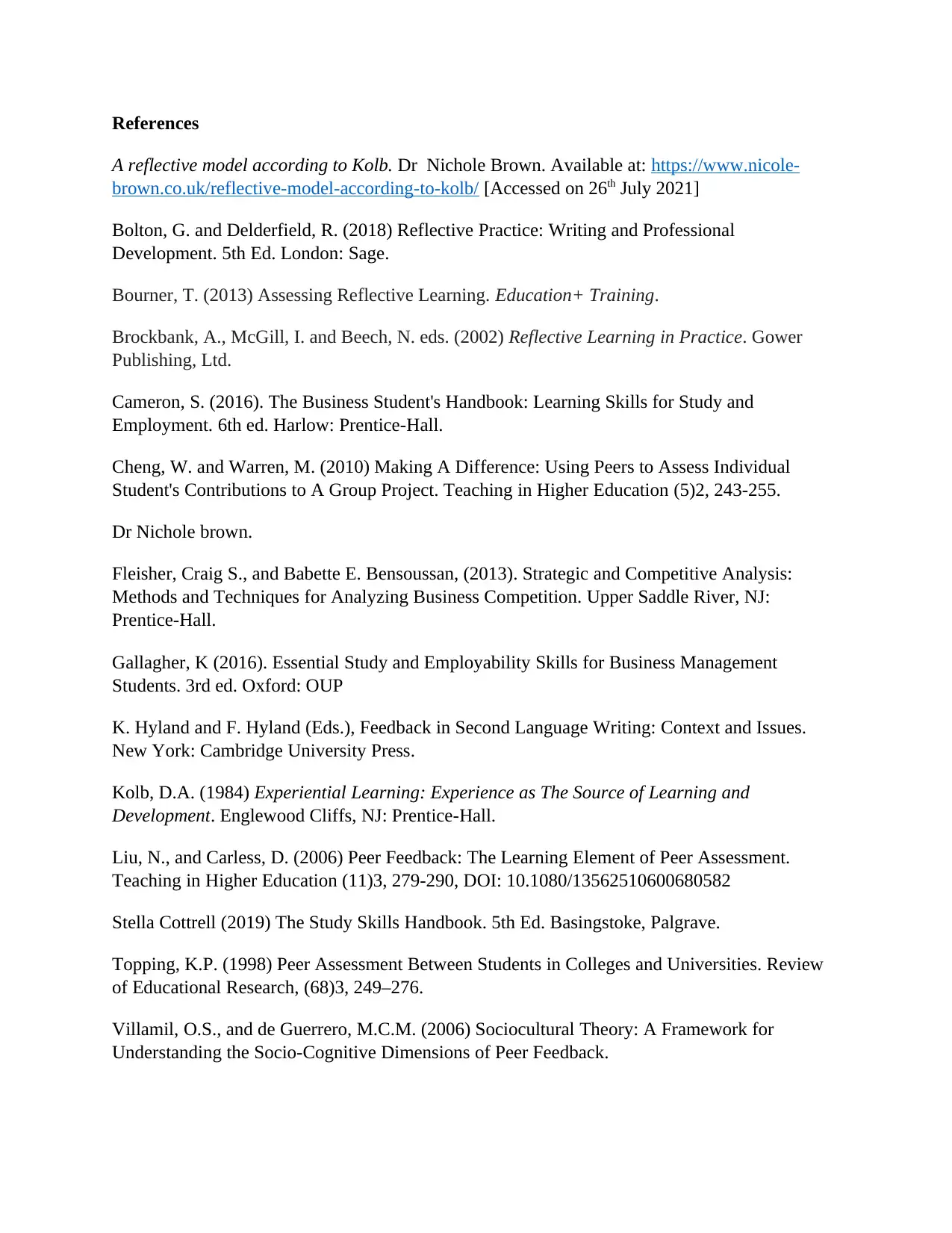
References
A reflective model according to Kolb. Dr Nichole Brown. Available at: https://www.nicole-
brown.co.uk/reflective-model-according-to-kolb/ [Accessed on 26th July 2021]
Bolton, G. and Delderfield, R. (2018) Reflective Practice: Writing and Professional
Development. 5th Ed. London: Sage.
Bourner, T. (2013) Assessing Reflective Learning. Education+ Training.
Brockbank, A., McGill, I. and Beech, N. eds. (2002) Reflective Learning in Practice. Gower
Publishing, Ltd.
Cameron, S. (2016). The Business Student's Handbook: Learning Skills for Study and
Employment. 6th ed. Harlow: Prentice-Hall.
Cheng, W. and Warren, M. (2010) Making A Difference: Using Peers to Assess Individual
Student's Contributions to A Group Project. Teaching in Higher Education (5)2, 243-255.
Dr Nichole brown.
Fleisher, Craig S., and Babette E. Bensoussan, (2013). Strategic and Competitive Analysis:
Methods and Techniques for Analyzing Business Competition. Upper Saddle River, NJ:
Prentice-Hall.
Gallagher, K (2016). Essential Study and Employability Skills for Business Management
Students. 3rd ed. Oxford: OUP
K. Hyland and F. Hyland (Eds.), Feedback in Second Language Writing: Context and Issues.
New York: Cambridge University Press.
Kolb, D.A. (1984) Experiential Learning: Experience as The Source of Learning and
Development. Englewood Cliffs, NJ: Prentice-Hall.
Liu, N., and Carless, D. (2006) Peer Feedback: The Learning Element of Peer Assessment.
Teaching in Higher Education (11)3, 279-290, DOI: 10.1080/13562510600680582
Stella Cottrell (2019) The Study Skills Handbook. 5th Ed. Basingstoke, Palgrave.
Topping, K.P. (1998) Peer Assessment Between Students in Colleges and Universities. Review
of Educational Research, (68)3, 249–276.
Villamil, O.S., and de Guerrero, M.C.M. (2006) Sociocultural Theory: A Framework for
Understanding the Socio-Cognitive Dimensions of Peer Feedback.
A reflective model according to Kolb. Dr Nichole Brown. Available at: https://www.nicole-
brown.co.uk/reflective-model-according-to-kolb/ [Accessed on 26th July 2021]
Bolton, G. and Delderfield, R. (2018) Reflective Practice: Writing and Professional
Development. 5th Ed. London: Sage.
Bourner, T. (2013) Assessing Reflective Learning. Education+ Training.
Brockbank, A., McGill, I. and Beech, N. eds. (2002) Reflective Learning in Practice. Gower
Publishing, Ltd.
Cameron, S. (2016). The Business Student's Handbook: Learning Skills for Study and
Employment. 6th ed. Harlow: Prentice-Hall.
Cheng, W. and Warren, M. (2010) Making A Difference: Using Peers to Assess Individual
Student's Contributions to A Group Project. Teaching in Higher Education (5)2, 243-255.
Dr Nichole brown.
Fleisher, Craig S., and Babette E. Bensoussan, (2013). Strategic and Competitive Analysis:
Methods and Techniques for Analyzing Business Competition. Upper Saddle River, NJ:
Prentice-Hall.
Gallagher, K (2016). Essential Study and Employability Skills for Business Management
Students. 3rd ed. Oxford: OUP
K. Hyland and F. Hyland (Eds.), Feedback in Second Language Writing: Context and Issues.
New York: Cambridge University Press.
Kolb, D.A. (1984) Experiential Learning: Experience as The Source of Learning and
Development. Englewood Cliffs, NJ: Prentice-Hall.
Liu, N., and Carless, D. (2006) Peer Feedback: The Learning Element of Peer Assessment.
Teaching in Higher Education (11)3, 279-290, DOI: 10.1080/13562510600680582
Stella Cottrell (2019) The Study Skills Handbook. 5th Ed. Basingstoke, Palgrave.
Topping, K.P. (1998) Peer Assessment Between Students in Colleges and Universities. Review
of Educational Research, (68)3, 249–276.
Villamil, O.S., and de Guerrero, M.C.M. (2006) Sociocultural Theory: A Framework for
Understanding the Socio-Cognitive Dimensions of Peer Feedback.
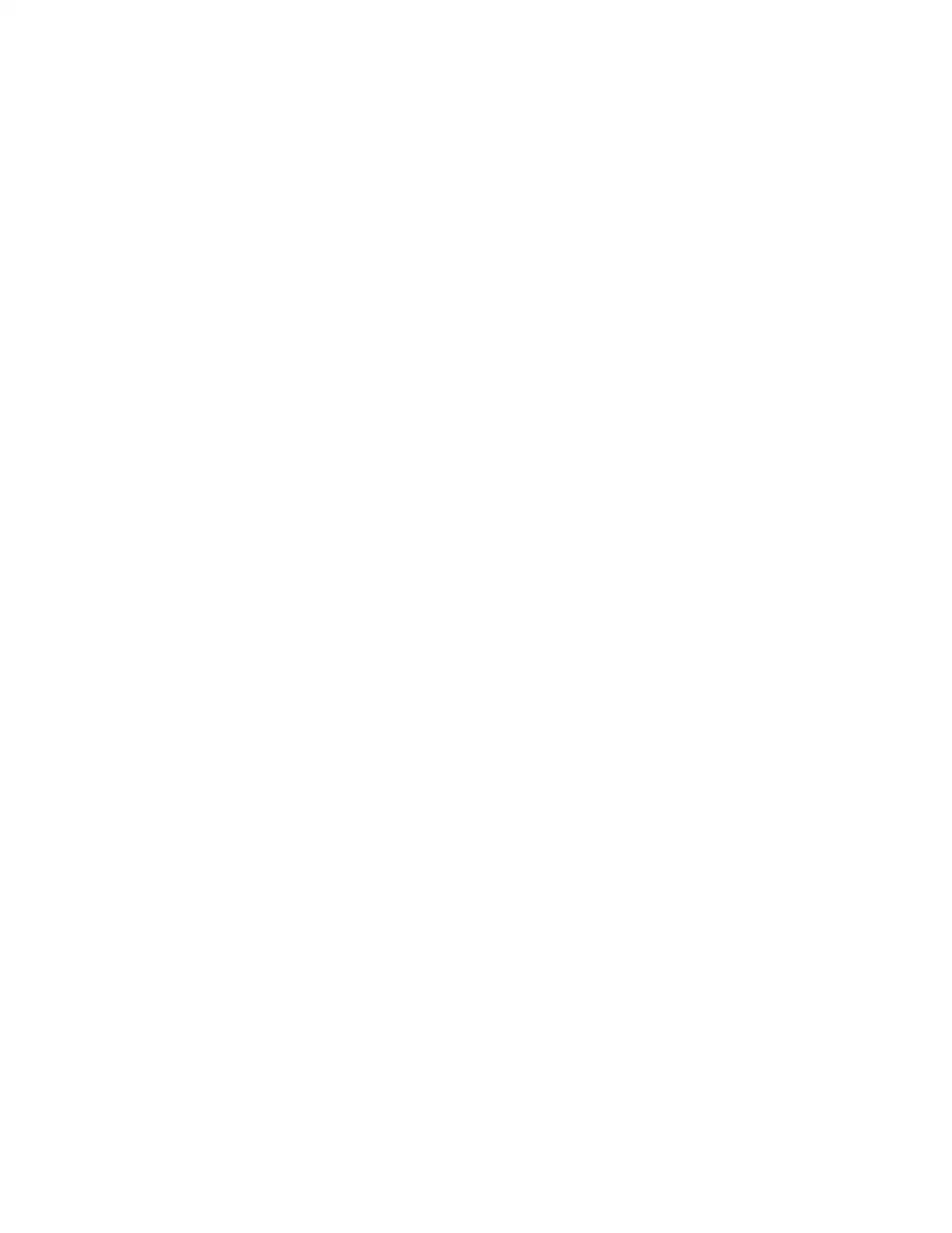
⊘ This is a preview!⊘
Do you want full access?
Subscribe today to unlock all pages.

Trusted by 1+ million students worldwide
1 out of 6
Related Documents
Your All-in-One AI-Powered Toolkit for Academic Success.
+13062052269
info@desklib.com
Available 24*7 on WhatsApp / Email
![[object Object]](/_next/static/media/star-bottom.7253800d.svg)
Unlock your academic potential
Copyright © 2020–2025 A2Z Services. All Rights Reserved. Developed and managed by ZUCOL.

